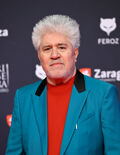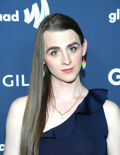
For so many of us who grew up watching almost uniformly negative representations of our lives on the screen, finally seeing a semblance of our community and our stories reflected in all their glorious diversity brings great joy despite how far we have yet to go.
Queerty is highlighting six creators, all of whom identify as LGBTQ, and all of whom have created provocative, queer-themed work designed to educate and enlighten audiences. Their contribution has made a striking difference in what we see on TV: GLAAD’s annual Where We Are on TV report found that of all the LGBTQ characters on television, 47% are people of color–a record high.
From timely subjects to groundbreaking levels of visibility, their passion, their risk-taking, and their artistry have given us pride not just in them, but in ourselves and our community. True representation still has a long way to go, but these fine people are working to make that day come faster.
1. Matthew Lopez

Opening on Broadway last year, Matthew Lopez’s The Inheritance could not have been a more timely celebration of the anniversary of Stonewall: It examines how AIDS unleashed a torrent of activism and the debts that generations owe one another.
Loosely based on E.M. Forster’s novel Howard’s End, The Inheritance explores themes that have long fascinated Lopez, who has long been interested in bringing to the theater people and themes that have long gone unnoticed. His first play, The Whipping Man, was about the relationship between former slaves and their masters in the aftermath of the Civil War. Reverberation focused on the friendship between a gay man and an older woman, and how violence fosters loneliness. The Legend of Georgia McBride mixed drama and comedy in the story of an Elvis impersonator turned drag queen.
For Lopez, The Inheritance acted as a metaphor for his own understanding of older generations of gay men: a translation of their struggle, and how that fight became the struggle of today.
As Lopez told Entertainment Weekly:
Once you attempt to just understand someone else, walk in their shoes for a bit, you can write very compassionately. You can hopefully write honestly about them without having had lived their life as well. I hope in return, I’ve explained my generation to the older generation a little better and in the relationships that I’ve forged is a result of working on the play. The play has allowed me a broader understanding of the community that I belonged to. It has expanded my definition of what that community looks like. It’s given me a real sense of belonging when I had felt a real sense of alienation.
2. Ryan White

2020 saw director Ryan White return with his most ambitious endeavor yet: the five-hour docuseries Visible: Out on Television. Produced by Wanda Sykes and Wilson Cruz, the show traced images and portrayals of LGBTQ people from the earliest days of TV to the present to show how the medium both helped and harmed queer representation. White has built a career on telling stories often overlooked by history through a queer lens. With Visible: Out on Television, he turns that lens on the diversity of queer history itself, teaching the lessons of the past, providing hope for the future, and helping us understand the world we inhabit just a little bit better.
White’s 2019 documentary Ask Dr. Ruth detailed the life of the world’s most famous sex therapist and her mission to fight stigma. The Netflix series The Keepers delved into the mystery of the murder of a beloved teacher, and the secrets (including a few closeted gays) that make the case a labyrinth of horror. With The Case Against 8, White exposed the nefarious political forces behind California Proposition 8, which banned same-sex marriage.
Visible: Out on Television is one of the most exhaustive histories of queer imagery in popular entertainment, worthy of mention alongside the great Vito Russo’s The Celluloid Closet.
I didn’t want to do Visible as a clip show. I wanted the liberty of fleshing out these storylines to have a beginning, middle and an end, not just rapid-fire through history. I think that’s why there are a gazillion A-List celebrities in it, but there are also a lot of activists in it. Actors, showrunners, they get congratulated all the time, and they deserve it. But the people who were using television as a tool to force progress. Because I’m LGBTQ, I know what those experiences were like for me watching TV. So I was deeply interested in finding out from people from every generation how that impacted them.
3. David France

David France‘s documentary, Welcome to Chechnya, chronicles how LGBTQ Russians live in constant fear of violence and imprisonment. France made Welcome to Chechnya at some personal risk. As a journalist asking tough questions about the treatment of a vulnerable minority, he too could have become the target of violence while filming in Russia & Chechnya.
France began his career as a journalist in the 1980s, penning articles on the AIDS crisis which had begun to ravage New York City. His brave early beat cost him then, too: The New York Post fired him for being open about his sexuality but he persisted– landing an editorial job at Newsweek.
At the turn of the century, France broadened his story-telling. He wrote three investigative books beginning in 2004: Our Fathers confronted the Catholic sex abuse scandals at the dawn of the crisis, while The Confession detailed the rise and fall of former New Jersey Governor Jim McGreevy, who spent years living in the closet for fear that coming out would wreck his political career. 2016 saw France’s How to Survive a Plague, a chronicle of the AIDS crisis, which detailed how the inaction of the Reagan & Bush White Houses made HIV a worldwide epidemic.
France went on to direct the film adaptation of How to Survive a Plague in 2012, which earned him an Oscar nomination for Best Documentary. He’s worked in documentary film since: The Death and Life of Marsha P. Johnson chronicled the life of the African-American transgender activist who was one of the Stonewall denizens who fought back. The film pushed back against the notion that only white men participated in the Stonewall Uprising, and helped raise Johnson’s profile as a hero to both the LGBTQ and African-American communities.
Welcome to Chechnya confronted the lethal homophobic policies of leaders like Vladimir Putin and Ramzan Kadyrov while taking other governments–including the United States–to task for ignoring this humanitarian crisis.
As France told Exberliner:
We’ve seen other explosions of extreme homophobia and anti-queer violence in Russia, Poland, the United States, places where you thought that things were irreversibly heading in the direction of liberalism. This is the tip of a global iceberg and I didn’t think that homophobia could be weaponized again, the way it was in the 1950s, 60s and 70s. I thought that that would be impossible. In almost every society, we have celebrities who are queer, politicians who are queer. And yet, we’re looking at the first place and the first time since Hitler that a top-down government-sponsored campaign exists to round-up every LGTBQ person for execution.
4. Ryan Murphy

Six months into the year, Ryan Murphy has produced three of the most talked-about—and queerest—projects of 2020.
The Netflix series Hollywood imagined the Hollywood Golden Age that could have been (and one day will be), where women and people of color enjoyed the same opportunities as their white male counterparts. Director Rachel Mason’s Circus of Books told the story of the West Hollywood porn shop, where a conservative Jewish family created a safe space during an era of discrimination and violence.
Director Chris Bolan’s documentary film A Secret Love chronicled the relationship between Terry Donahue and Pat Henschel, a couple whose love spanned more than 65 years.
This year will also see the release of the Murphy-produced The Boys in the Band, a remake of Mart Crowley’s seminal play about a group of gay men in the pre-Stonewall era.
Ryan Murphy has helped normalize and employ a diverse cast of LGBTQ people for a huge international audience. Queer teenagers in Glee and The Politician. Black trans people in Pose. The list goes on. Moreover, rather than appropriate stories, Murphy hires writers and directors directly from the communities he’s portraying to oversee production, in front of the camera and behind it. For example, in the case of Pose, Murphy hired transgender writer/director Janet Mock, who had no prior experience behind the camera. She’s since gone on to write and direct episodes of The Politician and Hollywood, and secure an exclusive development deal with Netflix.
But that’s just the start of his contributions to our cause. He’s also carefully nurtured a talented group of actors and creators who will contribute to representing the diversity of our community for years to come. From actors Sarah Paulson and Billy Porter; to writers Stephen Canals and Our Lady J; and directors such as Janet Mock and Rachel Mason, these creators will continue to change the world for the better for a long, long time.
Murphy attributes the passion for diverse representation to living through the AIDS epidemic.
I remember every time I went to do an HIV test, I would say ‘God, if I can just live, I’ll do whatever it takes.’ I would make this bargain that every time I would go and get a test I would do another year of services at an HIV anonymous call center. So I did that for a long time. I would take the calls from people who were contemplating suicide, or they were being shunned, or they were afraid of telling their parents. It was very dark and very upsetting. I guess I’ve been reliving that experience.
How about we take this to the next level?
Our newsletter is like a refreshing cocktail (or mocktail) of LGBTQ+ entertainment and pop culture, served up with a side of eye-candy.
5. Alice Wu

Alice Wu‘s The Half of It debuted on Netflix in Aril, the perfect companion project to her debut film Saving Face. Both focus on the intersectionality of being Chinese-American and lesbian—something Wu, who resides in San Francisco, knows from lived experience.
The Half of It didn’t come easily. It generated buzz in 2018 when it circulated Hollywood, eventually landing a spot on The Black List, a collection of the best, unproduced screenplays in town. The utterly authentic and natural way in which Wu is able to show how respect for diversity actually helps people learn and grow is one of the strengths of the movie.
The film reimagines Cyrano de Bergerac in a high school setting. It follows the story of a Chinese-American student named Ellie hired by a football jock for her writing skills to help him woo one of the most popular girls in school, Aster. As Ellie starts penning love letters to Aster, she begins to realize that she actually is in love with her, too.
I think I write a lot to understand both myself and the world. I thought I want to set this in a small, rural town. I don’t want it to be a menacing town. I wanted there to be an affection for it. I thought it was a way for me to understand, and also, that some kid or adult would watch this movie and say “Oh, that’s just like the town I live in” or “the one I grew up in.” And it might make them think about that one immigrant family, or that one POC family, or that one kid who is different and coming out as queer or trans or different in some way. I thought it was my best shot at affecting the cultural conversation.
6. Tanya Saracho

April saw the return of Vida, the beloved Starz series. The show focuses on urban gentrification as experienced by two Mexican-American sisters. Now in its third and final season, Vida earned wide acclaim for its portrayal of Latino culture, and how immigrants sometimes struggle balancing traditional and American identities. That balance translates to director Tanya Saracho’s personal life as well. During the 2020 George Floyd protests, Saracho tweeted her support for #BlackLivesMatter, calling for her followers to take part in the movement.
“Words of sentiment can feel so empty right now,” she wrote. “I have started so many tweets expressing my feelings about the senseless tragedy that befell #GeorgeFloyd & about how our black brethren are in everyday danger. But the words feel hollow. Action. I need action. A real how and what.”
Saracho spent most of her youth between Mexico, where her father lived, and Texas, where her mother resided. She eventually settled in the US, studying at Boston University. After college, she worked in the Chicago theatre scene, where she founded Teatro Luna, an all-Latina theatre company. She then landed a writer’s job for Devious Maids, and later, as a story editor for Looking.
Starz executives then hired her to create a “millennial” show about women. The result, Vida, examined life among Latina women with a queer twist.
Saracho, who identifies as lesbian, set out to create opportunities for other marginalized artists. While Vida earned a reputation in large part because of its Latinx content, the show also skillfully integrated LGBTQ characters.
As Saracho told Deadline:
I never thought of it as a queer show, early on. It was just the show I was writing. That actually came later when people started framing the show when it already existed. But I wasn’t saying, ‘I’m writing a queer show,’ because it was just a show that was true to life, to me. Also, I didn’t go, ‘I want to write a queer show and I want to staff most of my writers queer.’ That mattered, but I just felt like the people who I staffed were the best people to tell this story that was steeped in queerness. But calling it a queer show came later. For me it was like, this is the story I’m telling, as true to life as I can.






















